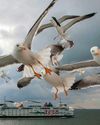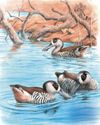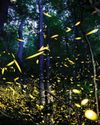Perilously close to extinction 100 years ago, the Asiatic lion has made a remarkable recovery. Sarah McPherson reports on the combined efforts that made it happen – and what lies ahead.

We never really think of India as lion country. Lions belong on the savannahs of Africa, patrolling the long grass and reclining on rocky outcrops. India, surely, is tiger country, where these iconic cats rest on crumbling temples and cool off in mirror-calm pools.
Yet India, too, has lions. These are members of the Asiatic subspecies, descendants of those that left north Africa some 21,000 years ago and dispersed as far as Europe and south-west Asia. But then came a succession of Mughal emperors, maharajas and colonial rulers with an insatiable thirst for trophy hunting. One by one, India’s states emptied of lions. By the early 1900s, the subspecies was confined to a relic population of just 20 or so individuals in Gir, a region of rolling dry forest, scrubland and savannah in the western state of Gujarat. It was only the last-ditch intervention of two successive ruling princes that prevented these cats from vanishing for good.
Since then, thanks to decades of in-depth conservation work and extraordinary support from local people, the Asiatic lion has clawed its way to recovery, with numbers soaring to 523 at the most recent count in 2015. “It’s one of the greatest conservation success stories in the world,” says Gitanjali Bhattacharya, biologist and manager of international conservation charity the Zoological Society of London’s (ZSL) South and Central Asia programme. “The Asiatic lion is now flourishing in its landscape. Not only has its future been secured, but it’s even starting to regain some of its old territories.”
Much has been invested in safeguarding the subspecies, with conservation efforts spearheaded by the government-funded Gujarat Forest Department (GFD). The human landscape bears obvious signs of husbandry towards the lions: signs instruct trains to slow to 20kmph; wells are covered or adapted with parapets; water sources are provided.
This story is from the January 2017 edition of BBC Wildlife.
Start your 7-day Magzter GOLD free trial to access thousands of curated premium stories, and 9,000+ magazines and newspapers.
Already a subscriber ? Sign In
This story is from the January 2017 edition of BBC Wildlife.
Start your 7-day Magzter GOLD free trial to access thousands of curated premium stories, and 9,000+ magazines and newspapers.
Already a subscriber? Sign In

Does cloning create identical copies?
EMBRYOS ARE MADE OF STEM CELLS that divide to give rise to different types of cells, everything from skin to brain cells. Scientists once thought that reproductive cloning creating a genetically identical copy of an individual organism - would be impossible without using stem cells and that the path leading to mature 'differentiated' cells was irreversible. But clawed frogs proved them wrong...

Tool-using animals
Our pick of 10 species that exhibit this special skill

Mission Blue
Sylvia Earle has dedicated her life to marine conservation; she tells BBC Wildlife why protecting the ocean is essential to all life on earth

RESHARK
The world's first shark rewilding initiative has seen zebra sharks released in the waters of Indonesia's Raja Ampat archipelago

ON DECK
Ferries aren't just for transport, they're also perfect vessels for conservation

IT'S A COLOURFUL LIFE
Delve into the unique and complex biology of the clownfish, arguably the world's most famous fish

BAHAMAS BENEATH
A dive into the waters of this famous island nation with the creatures that call it home

"To save the reef, we need everybody involved"
Indigenous peoples may hold the key to protecting the Great Barrier Reef

SPINNING AROUND
Going around in circles proves fruitful for this filter-feeder

BLINDED BY THE LIGHT
On balmy evenings, amorous beetles put on a spellbinding show in North American forests